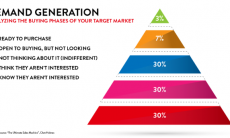81% of consumers research online before buying. (GE Capitol)
If the goal of marketing is to reach the consumer at moments that most influence their buying decision, then understanding online consumer behavior is key for any business.
Here are 50 facts about online consumer behavior not to ignore. They start from finding your audience and selling to them to satisfying them and keeping them satisfied.
FINDING YOUR AUDIENCE
- 97% of consumers turn to a search engine when they are buying a product vs. 15% who turn to social media. (Conductor)
- 96% of consumers have searched for product information from their mobile device. (Google)
- 95% of Millennials expect brands to have a Facebook presence. (Social Media Examiner)
- 94% of B2B buyers research online for purchase decisions. (State of Procurement Study)
- 89% of shoppers do online research before purchasing an item in-store. (Interbrand)
- 88% of consumers made their final purchase in store. (GE Capitol)
- 88% of consumer trust online reviews as much are personal recommendation. (Search Engine Land)
- 87% of Gen X-ers (30- to 44-year-olds) and 70% of those ages 45 to 60 think brands should, at the very least, have a Facebook page. (Social Media Examiner)
- 85% of all consumer purchases are made by women, including everything from autos to health care. (Greenfield Online)
- 80% of consumer internet traffic will come from video in 2019, compared to 64% in 2014. (Cisco)
- 79% of shoppers feel empowered by technology because it provides access to information. (GE Capitol)
- 28% of all online activity is spent on social networks. (Global Web Index)
- American adults spend 5.5 hours a day viewing video content. (eMarketer)
SELLING TO THEM
- 81% of customers reach out to friends and family members on social networking sites for advice before purchasing products. (Digital Buzz)
- Consumers spend an average of 79 days gathering information before making a major purchase. (GE Capitol)
- 77% of online shoppers use reviews to make a purchase decision. (Digital Buzz)
-
60% of consumers prefer to share their information about the products with others online. (Research Gate)
- 50% of shoppers have made a purchase based on the recommendation of the people they follow (and like) on social networks. (Digital Buzz)
- 50% use their smartphone to look up restaurants/bars, and 31% to research or book travel. (Google)
- 42% of shoppers spend over half their shopping time doing online research. (Interbrand)
- 38% of people buy online because of low prices. (RubyMarketer.com)
- 35% intentionally carry their smartphone while shopping so they can comparison shop. 32% said they had changed their mind about purchasing in-store based on information found online while shopping. (Google)
- 35% of American smartphone users have purchased through their mobile device, 68% of those within the last month. However, 65% still prefer to purchase while on their computer. (Google)
- 33% of men and 38% of women don’t buy online because they want to touch the product before the buy it. (RubyMarketer.com)
- 5-20% is probability of selling to a new prospect. 60-70% is probability of selling to an existing customer. (Marketing Metrics)
SATISFYING THEM
- 89% of consumers have stopped doing business with a company after experiencing poor customer service. (RightNow Customer Experience Impact Report)
- 83% of consumers require some degree of customer support while making an online purchase. (eConsultancy)
- 76% of consumers believe the customer service they received shows how the company values them as a customer. (Aspect Consumer Experience Survey)
- When shopping online, 58% of women and 44% of men are concerned about the cost of shipping. (Three Deadly Venoms)
- 45% of US consumers will abandon an online transaction if their questions or concerns are not addressed quickly. (Forrester)
- 45% of companies offering web or mobile self-service reported an increase in site traffic and reduced phone inquiries. (CRM Magazine)
- It takes 12 positive customer experiences to make up for one negative experience. (Parature)
KEEPING THEM SATISFIED
- 80% of companies say they deliver “superior” customer service while only 8% of customers feel the same way (Lee Resources)
- 75% of consumers believe it takes too long to reach a customer service agent (Harris Interactive)
- 70% of buying experiences are based on how the customer feels they are being treated. (McKinsey)
- 62% of online shopper are brand loyal. (Interbrand)
- 60% of consumers state their expectations for customer service are higher now than they were just one year ago. (Global State of Multi-channel Customer Service Report)
- 59% would try a new brand or company for a better service experience. (American Express)
- 55% of consumers would pay more for a better customer experience. (Salesforce)
- 50% of consumers believe customer service agents fail to answer their questions.
- 42% of service agents are unable to efficiently resolve customer issues due to disconnected systems, archaic user interfaces, and multiple applications. (Forrester)
- 33% of consumers would recommend a brand that provides a quick but ineffective response. (Nielsen-McKinsey)
- 19% think it’s very important that retailers have mobile friendly websites (GE Capitol)
- 17% of consumers would recommend a brand that provides a slow but effective solution. (Nielsen-McKinsey)
- 10% increase in customer retention levels result in a 30% increase in the value of the company. (Bain & Co)
- Americans tell an average of 9 people about good experiences and 16 about poor experiences (American Express)
- It is 6-7 times more costly to attract a new customer than it is to retain an existing customer. (White House Office of Consumer Affairs)
- A customer is 4 times more likely to buy from a competitor if the problem is service related vs. price or product related. (Bain & Co.)
- Consumers are 2 times more likely to share their bad customer service experiences than they are to talk about positive experiences. (2012 Global Customer Service Barometer)
Do these facts help you to better understand online consumer behavior? Do these cause you to think about your marketing? Does your business need help navigating online consumer behavior?




